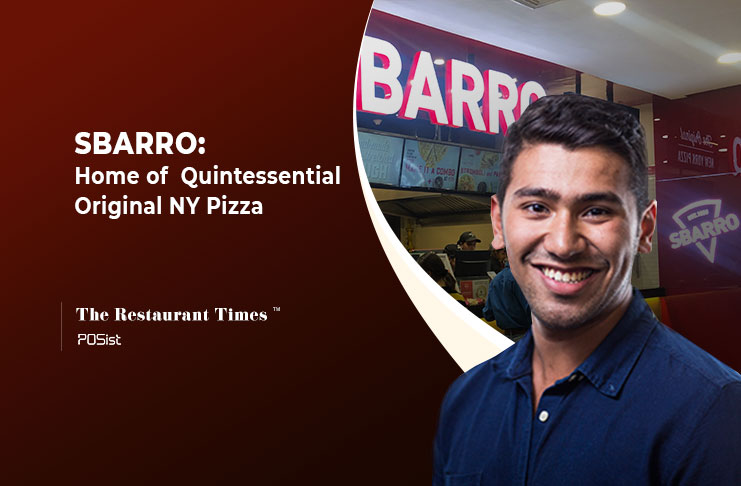F&B entrepreneur, Akshay Balwani entered the hospitality industry two years back. Having previously worked with Microsoft, as a Product Marketing Manager, his passion for food drove him to enter this industry. Akshay discovered the potential for pizza outlets in Mumbai and that is when he decided to procure the master franchise of Sbbaro LLC. Sbarro India is operated by Upper Crust Foods Pvt. Ltd. It delivers authentic New-York style pizza across twenty-plus outlets in Mumbai.
In Conversation With Akshay Balwani of Sbbaro
In an exclusive conversation with The Restaurant Times, Akshay Balwani talks of his journey in the industry, the story behind Sbbaro, key tips to run a franchise model, and a lot more.
Key Tips To Run a Successful Franchise Model
Operating a business is different than operating a franchise. Although owning a restaurant franchise may seem like a “get wealthy quick” scheme to some, the fact is, it takes a great deal of hard work, time, and money to sustain and thrive. Balwani shares some key tips to run a successful franchise model:
- Addressing What Your Consumers Want: Sbbaro LLC has been delivering slice pizzas across 630 eateries in 28 countries. Sbbaro India is the master franchisee in a country where the customer base is very different, compared to other countries. According to Balwani, it is imperative to take care of the customer’s needs and wants. In India, the market is very delivery focussed, unlike in the US. This led them to come up with their own delivery model to cater to the needs of local consumers easily. Lack of awareness of consumers’ wants and spending behavior might lead to a downfall.
- Communication With The Franchisor: Communication performs a critical role in addressing the issues faced or suggestions given by customers of the respective franchise. Sbbaro India caters to the Indian market by serving authentic NY pizza. Bawani believes that communication with the franchisor is a crucial factor. Franchisees have to run business in accordance with the franchisor’s brand specifications. To run the business efficiently, a proper communication module is vital to show the transparency of the operations and to eliminate any confusion between the franchisee and the franchisor.
‘Making our franchisor understand the Indian market and running the business according to the customer needs is how we run the business and not essentially how it was running for all these years. We serve pizzas by innovating it according to the local taste, like BBQ Paneer and Chicken pizzas as well,’ says Balwani.
Image Credit : Sbarro Store
Challenges Faced While Running The Franchise Model
To run a franchise model to its maximum potential, a restaurateur has to go through a lot of ups and downs. Here are some challenges faced by Balwani while running the franchise model:
- Striking A Balance Between The Brand and Franchisee: It is essential to maintain a balance between what the parent brand has worked for all these years and the aspirations of its franchisees. One fundamental element in discovering the right balance is for the franchisor and franchisee to understand their individual roles as well as the others. The franchisor has to keep in view the marketing dynamics, price sensitivity and other factors responsible for opening a franchise. Similarly, the franchisee has to pay importance to the core values of the brand.
- Consensus With What To Offer: Balwani says it is essential for the franchisor and the franchisee to come to a consensus with regard to what they have to offer to the market. Although franchise owners own their restaurants, they do not own the brand, which under a license is given to the, essentially on lease for a specified length of time. It is important for the franchise owner to make the parent owner understand the tastes and preferences of the people in the country where the franchise is operating and come to a consensus about what to offer.
Online Delivery VS Dine-In Business
Balwani mentions that online delivery with third party food aggregators like Swiggy, Zomato and UberEats has evolved drastically in the past three and a half years.
Online food delivery has emerged as one of the most fast-paced developments in the e-commerce space. This sector has revolutionized the entire outlook towards the food industry as consumers now have the privilege to choose from a wide variety of cuisines, anywhere, anytime from a range of restaurants listed online.
“In Tier lll markets people would still like to go out and dine in at restaurants. But in Tier l markets, due to heavy traffic and the evolving trend of having food delivered at home, consumers like to order food at home. More and more consumers are shifting towards ordering food at home,” says Balwani.
Balwani shares that in partnering with the online delivery partners, the control of product quality moves from the owner to the delivery partners while in transit. Sbbaro has its own delivery model so that the delivery is made smoothly without disturbing the product.
According to Balwani, customers have stopped giving importance to the final product. He shares his experience of customers complaining about the final product when it was delivered. Even after complaining, customers would end up ordering from third party food aggregators, due to heavy discounts and offers.
With population growth, globalization and the arrival of the internet, food trends in the restaurant space are undergoing an all-round change. Balwani concludes by saying, “The food service industry might be growing but the restaurant space is risky, and there are so many factors at play. Many restaurant startups never last beyond the first 3 to 6 months. A risky business that can go big or fail quickly – or slowly. One must be absolutely convinced that their business will leapfrog competitors, even when the worst possible problem they can imagine comes along and casts a dark shadow on their confidence.”
Image Credit: Sbarro
Technology Implementation
Restaurant management seems like a completely manual process, however, technology plays an integral role in streamlining operations that ultimately leads to better guest experience.
Balwani has been using Posist at his outlet. According to Balwani, technology has played a critical role in managing restaurant operations.
‘The base kitchen module helps us in understanding the variance in the products. There is a detailed recipe for every dish which helps us in cutting down the overall food costs. Even if there is a discrepancy of 5% in terms of the food costs, it can be tracked with the help of Posist,’ says Balwani.
The detailed reports and data help in understanding the business and making crucial decisions for the restaurant. Another area where Posist helps is, tracking theft and pilferage so that it can be effectively reduced.
Strategic Learnings From Balwani’s Culinary Experience
- Market Research is the key: Market research for a restaurant doesn’t end after the grand opening. One should be conducting market research every year to make sure your restaurant is still giving your customers what they want. Market research will give the restaurateur, the framework to tackle any drawbacks in the customer experience and improve the overall experience for the customer.
- Continuous Innovation in the Business: Customers are transforming, tastes are shifting, dining experiences are changing, competition is intensifying, and the players in the industry are evolving. The increase in online delivery services, pre-prepared food, and booking aggregators is all transforming the restaurant business. With this comes the need for innovation; restaurants must focus on menu innovation every year, offer chef’s specials on a particular day of the week, work on communicating better with the guests in order to enhance their experience.
- Do Not Forget the Operations of the Restaurant: Balwani mentions that restaurateurs usually forget about the operations of the restaurant, as they pay more attention to the glamor that comes with it. Restaurant operations include all activities involved in the preparation of food, customer service, cleaning, purchasing raw materials, accounting, reporting, etc. It is necessary to plan ahead and leverage technology (POS) efficiently to make things simpler.
- Right Employee Management Policies: Many entrepreneurs start their restaurant businesses and to their surprise, they often encounter staffing issues. Handling restaurant employees is often the prime concern of restaurant management. More than the food and ambiance, it is the representatives of a restaurant that make consumers come back to your outlet again and again. One should have strong employee management policies to take care of their employees. The employees should feel secure while working for you. Once you are able to gain professional confidence from the employee’s side, then you are inevitably going to face fewer problems with your restaurant’s employee turnover.
- Building Customer Loyalty: Repeat buyers are the restaurant’s most valuable customers. In fact, only a 5% improvement in customer retention rates can yield between 25% to 100% increase in profits across industries—happy customers spend more money, more often. It is essential to build customer loyalty towards the brand by using different policies such as giving loyalty points through a customer loyalty program, encouraging customer feedback, using automation for asking reviews, etc.
Customers will always be one of the most precious stakeholders in your restaurant. How well you treat them will have a large influence on your restaurant business. Never treat your association with customers as transactional but preferably as a long-term relationship that needs to be nurtured. Only this way, can you give them the excellent customer service they deserve!



















Amazing article!